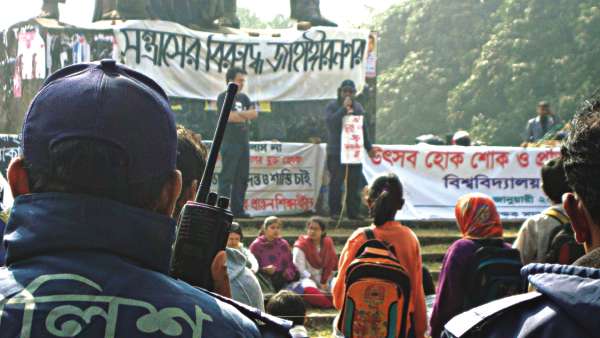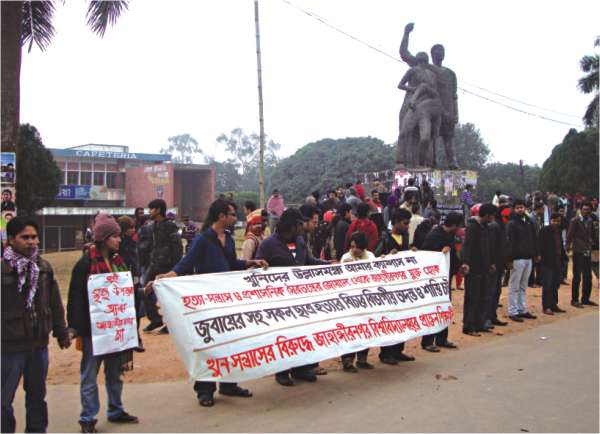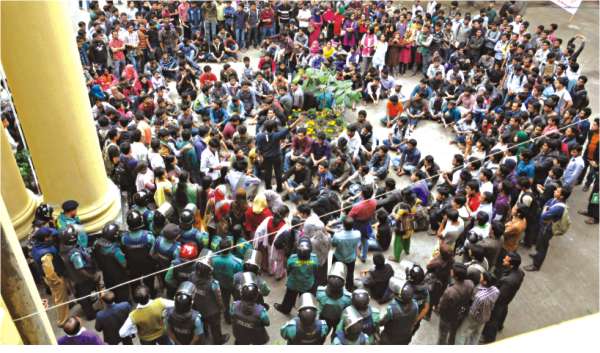| Spotlight

The Chronicles of Student Politics:
the current scenario
Fauzia Sultana
Photos: Star File
The young students are the gift of nature; they are a mine of green and fresh ideas. And in nurturing these ideas, the educational institutions play a vital role. University life is the time when one grows in knowledge, personality, and maturity, and the time when one realises his or her own self. Drama, sports, debate or even photography are few of the activities that students engage in, even in the midst of their hectic campus life. And a good number of students also engage themselves in what is called student politics.
Student politics, a term that used to reflect spontaneity decades back, no longer holds the same meaning when compared to the contemporary happenings taking place in Bangladesh. Given the current scenario at the educational institutions in the country today, it is sad how the lives of our students are gravely affected for the wrong doings of others, the consequences of which they may have to face for years unknown. The undeniable fact that student politics has reached such level of distortion, leaves us thinking how our students and not to forget our respected teachers define, understand and view student politics.

A simple confrontation lead to an ordeal at KUET.
Let us consider what happened at Khulna University of Engineering and Technology (KUET) recently. According to their tradition, the students of the Aumor Ekushe Hall arranged a feast for its students where the students were not happy with the food that was served. Upset by the fact that they had to pay a high amount of money for such unsatisfactory food quality, the students confronted the organisers, who happened to be students of the Chhatra League. Needless to say the confrontation broke out into an ordeal where the ordinary students ended up with broken bones and stab wounds, because the ordinary students voiced out against the corruption. Imagine what impression this incident might have created in the minds of the families of students who have sent or planned to send their children to this institution or any other, miles away from home, in the name of education.

The assaulted teacher at JU and his colleagues.
Commotion and violence can now be said to be synonymous to Jahangirnagar University (JU), and over the past few decades the campus scenario has remained unchanged, with over twenty clashes in the past three years. So when Zubair Ahmed, the fourth year student of the Department of English at JU died on January 8, people knew just like other times this too was a demise resulting from either personal or political conflict between the accused and the victim. However, what is alarming about this particular incident is the involvement of the university's Vice Chancellor (VC), Professor Shariff Enamul Kabir in this incident. Of course, the death of a student, on whatever grounds may be, is unacceptable and reprehensible. But what is rather interesting are the facts that emerged out of this incident. According to the reports, the cause of the violence had nothing to do with ideological but personal clash. Reports also suggest that the JU unit of Chhatra League has been kept suspended since July 2010, and if it so, then how are the two factions of BCL,

A human chain on JU campus for Zubair Ahmed.
Shamim-Sharif and Shafin-Sammo, still exercising their powers on JU campus. Teachers, officials and even general students alleged the VC of nurturing and patronising the 'killer group' or the Shamim-Sharif faction so to say, and that the academic has been controlling the JU unit of BCL, himself for the last one and a half years. Professor Shariff Enamul Kabir was appointed VC of JU in 2009. The VC, to whom the agitating students and teachers have already submitted their memorandum containing the demands, has however remained strong about not dismissing the proctor, who is accused of assaulting the teacher and president of Jahangirnagar University Teacher's Association (JUTA). Evidently, this gave rise to a collision between the pro and anti VC parties. Such occurrences are bound to cause the curious minds to think. Why would a VC of an institution foster such student politics, where he has to side with a faction and give them the privilege where they can control seat distribution and tender manipulation? And if at all he did not patronise and side with any faction as the VC had claimed himself, why did the Shamim-Sharif group come to the VC's rescue when he was confronted by hundreds of students with the death of Zubair's. And wouldn't one call it contradictory of the VC to remain rigid on not meeting the demands made by the anti-VC party and still desire to have a composed ambience on the campus.

Students of BUET at a press release.
But having said all that, it still remains a mystery as to why and how our students get entrapped in this web of student politics. Ashif Ikbal shares his views in this regard, “Sometimes it is out of peer pressure or even in exchange of a favour that students join politics in universities. I had a friend who was compelled to join one of the student political parties during his freshman year, who otherwise would not be allotted a room in the university dorm.” Ashif is an ex-Chhatro League activist and is a graduate from the Department of Chemical Engineering, BUET. “The reasons why our student politics fraternity is getting worse are because the students are getting weak in their morality. Most of them are not even motivated for the right reasons to come into politics; they come into politics because it is the easiest means of getting what they want by exercising power in the wrong way. Moreover, student politics is no longer student related. And a good example of this is the JU incident,” he adds.

Students of BUET staying up all night to protest against the occurance of December 31.
We grow up with the idea of politics as the process of nurturing leadership qualities. However, the reality is far from these idealistic words. Most of our students join the parties not to become leaders and establish themselves as a promise of tomorrow in the society, but to use the power that comes with the involvement. But having said that, we also have to understand why there is such change in trend in student politics and what exactly is making our students demoralised, before pointing our fingers at them and expressing negativity towards student politics. “We all know how significant roles students played in the history of our nation. These student parties have remained active and dedicated for years. However, after the early 90's students lost motivation and became frustrated by the ways things turned out in the country. Losing hopes for any positive changes, they started to follow the paths of the leaders of ruling parties who were using every possible way to make money and use their power. This lead to the gradual degradation of student politics which still continues to happen today,” shares Rakib Ahmed, who is a lecturer at the Department of Journalism and Media Studies, JU.
However we cannot ignore the fact that when one of the apples in the basket is rotten, we don't call the entire basket rotten. In other words, student politics does not only portray violence, commotion and killing, but it also has non-violent and resistant sides to it. The BUET authority has suspended three students and activists of Bangladesh Chhatra League from BUET for beating up a senior student on December 31, 2011. Hundreds of students gathered before the Pro-VC's office with their demand of expelling the culprit students. Of course their demands were not met immediately and the protesting students had to wait for three long days before they received a decision in their favour. What's commendable about this protest and the protesters is that they have not shown any sign of violence towards the administrators or the officials, and dealt with the matter in a mature and positive manner. Such non-violent behaviour not only poses the students' determination of getting justice, but also convey the message that violence is not always a way out.

Students at JnU gather to campaign against the fee hike.
Meanwhile, students of Jagannath University were assaulted by Chhatra League activists while campaigning for a class boycott in response to a fee hike. The students were assaulted by the activists because they behaved rudely with one of their teachers, while the students denied any such behaviour. On the other hand, regular classes and other academic activities at Shahjalal University of Engineering and Technology (SUST) remained suspended, while 20 of the university students were injured and three university buses were vandalised as consequences of the conflict between BCL and Islami Chhatra Shibir on January 11.
Student politics is a bygone term that reflects the Language Movement, Liberation War of '71, leadership and dignity in the context of Bangladesh. It is not a surprise if students today considered it rather selfish, commotional and negative, because it is. Students represent the dynamic part of our society in which lies the hope and future of our nation. Like we are encouraged to add sports, debates, singing to our student life, we are equally pushed to subtract student politics and activities as such from our student lives. And the recent incidents at KUET, BUET, JU, SUST and JnU make it all the more conducive for students to think so. It should be borne in mind that student politics is neither a rotten basketful of apples nor a basket full of rotten apples. As for the students, it is up to them to decide how they understand, define and view student politics.

Police were stationed on the BUET campus as a measure in case there was violence.
|
